Graduate Student Excellence-in-Teaching Awards
The Excellence-in-Teaching Award was established by the Graduate School to recognize those students who have demonstrated superior teaching skills and have contributed to teaching beyond their own classroom responsibilities, making a significant contribution to the instructional mission of the university.
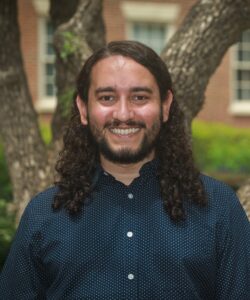
Jean Costa-Silva is a Ph.D. candidate in the Department of Linguistics in the Franklin College of Arts and Sciences. His major professors are Paula Jean Mellom and Bera Lee-Schoenfield. His primary interests pertain to second language acquisition, syntax and cognitive linguistics.
His work focuses on the acquisition of English and Portuguese as foreign languages. In essence, he is interested in how learners begin to employ different linguistic strategies to describe movement through space.
Costa-Silva has a B.A. in English Linguistics, Literature, and TESOL from the Federal University of Minas Gerais, as well as teaching certificates from the University of Oregon and the University of Cambridge.
Prior to coming to UGA, he taught English in Slovakia and Brazil for over 10 years. In 2017-2018, he received a Fulbright scholarship and worked in the Department of Romance Languages at UGA. Upon starting his Ph.D. at UGA, he was awarded a Goizueta Foundation Fellowship from 2019 to 2023. During his tenure in linguistics, he taught Generative Syntax and Study of Language. Costa-Silva is currently a teaching assistant for the Franklin College Writing Intensive Program, where he supports students in the Generative Syntax courses.
He also serves as the executive editor of UGA Working Papers in Linguistics, the social chair of the Linguistics Society at UGA, and the coordinator of the SLAC Research Group. In his free time, Costa-Silva likes to spend time with his friends, to watch TV series, hockey, and movies, and to travel the world.
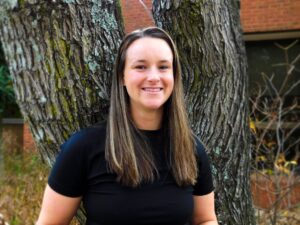
Carolyn Cummins is a Ph.D. candidate in the Odum School of Ecology. Her major professor is Amy Rosemond. Her dissertation research focuses on how temperature affects carbon cycling, aquatic insect physiology and organismal community structure in southern Appalachian headwater streams.
Cummins is passionate about effective and inclusive undergraduate education, and she has pursued various on- and off-campus teaching roles during her time at UGA. She traveled to Costa Rica as the teaching assistant for the UGA Costa Rica Tropical Sciences Study Abroad Program in 2021, and she served as an instructor-of-record on the UGA Interdisciplinary Field Program in 2022. She has also contributed to course design in the Odum School, helping to design and teach a new ecosystem ecology lab during the 2022-23 academic year.
Cummins is a candidate for the UGA Interdisciplinary Certificate in University Teaching, through which she has completed teaching-related coursework and a Scholarship of Teaching and Learning project focused on effective strategies for helping students understand scientific literature. Cummins will defend her dissertation in April, and she hopes to pursue an academic career that centers on teaching and mentoring. In her free time, she enjoys outdoor activities including hiking and rock climbing, cooking, reading and spending time with her partner, Zeb, and their dog, Lula.
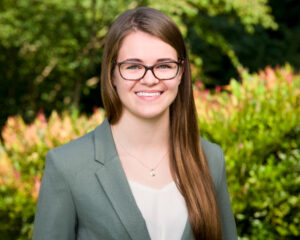
Rebekah Maynard is a Ph.D. candidate in the Department of Horticulture in the College of Agricultural and Environmental Sciences. Her major professor is Leonardo Lombardini. Her research focuses on increasing production of the biopharmaceutical compound, apigenin, in chamomile and parsley grown in controlled environments.
In addition to her dissertation research, she conducted teaching-related research in her department to determine faculty opinions about implementing a new, online master’s degree.
Maynard’s commitment to teaching started as an undergraduate student serving as a TA in introductory chemistry courses, and she has since taught in many upper-division horticulture classes at UGA. Her passion for teaching was inspired by faculty who cared deeply about creating meaningful learning experiences for their students.
Most recently, Maynard created an online fruit production course that prioritizes inclusive teaching practices. She completed the Interdisciplinary Certificate in University Teaching in 2021 and was selected as a Future Faculty Fellow in 2023. Ultimately, Maynard plans to become a professor of horticulture with a significant teaching appointment.
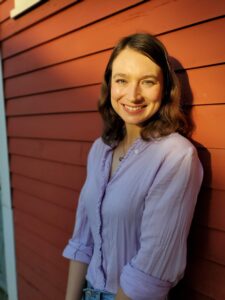
Margot Popecki is a Ph.D. candidate in the Department of Genetics in the Franklin College of Arts and Sciences studying the evolution of light signaling in fireflies. Her major professors are John Wares and Kathrin Stranger-Hall.
Growing up, she was an avid reader and creative writer, so the Writing Intensive Program has given her the opportunity to unite her passion for writing, teaching and evolutionary biology.
At UGA, Popecki has been involved with science outreach, from STEMzone to developing content and activities related to her research on fireflies.
After graduation, Popecki plans to pursue postdoctoral research to study conservation genomics. She is from Durham, New Hampshire, and has two dogs, Axel and Orla. Her hobbies include hiking, furniture restoration and sewing.
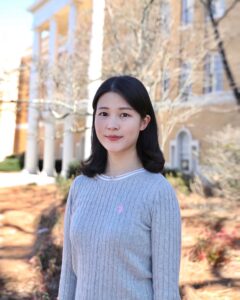
Jeongah Shin is a Ph.D. candidate in the Department of Textiles, Merchandising and Interiors in the College of Family and Consumer Sciences. She joined the program as a master’s student in 2018. Her research focuses on consumer emotion, attitude and behavior in computer-mediated environments.
Shin has expanded her research interests to the classroom under the theme of “bringing the technology into the classroom.” She consistently strives to integrate new technologies into the learning experience for fashion merchandising students.
Shin completed three innovative teaching projects (Wear Your Magic Box, Eye Tracking App Development, and Talk in Metaverse) under the direction of Yoo-Kyoung Seock. Shin has assisted several classes, including Trend Analysis and Forecasting, Fashion Product and Brand Management, UX/UI Design Application in Fashion Branding, and Fashion Meets Technology as a teaching assistant, co-instructor and instructor-of-record.
Additionally, she served as a graduate assistant for the FACS London Study Abroad Program in summer 2022. She was selected as a Future Faculty Fellow for the Center of Teaching and Learning and received the Outstanding Teaching Assistant Award in 2023. Shin expects to earn an Interdisciplinary Certificate in University Teaching in Spring 2024. She desires to become a researcher and instructor who constantly brings new technologies and industrial insights into the classroom.
Graduate Student Excellence-in-Research Awards
Graduate Student Excellence-in-Research Awards were initiated in 1999 to recognize the quality and significance of graduate-student scholarship, these awards may be given in five areas: Fine Arts, Humanities and Letters, Life Sciences, Mathematical and Physical Sciences, and Applied Studies.
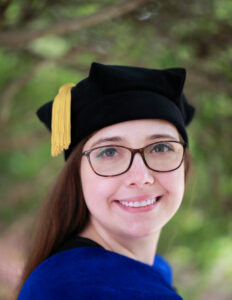
Anna Doner is a postdoctoral associate at Massachusetts Institute of Technology. Doner earned her Ph.D. in physical chemistry from the University of Georgia in May 2023. Her dissertation research explored chemical kinetics of alkyl-substituted cyclic ethers, an important class of combustion intermediates.
During her time at UGA, she contributed to method development for experimental diagnostics, built machine learning models to help identify combustion intermediates from experimental measurements and performed hundreds of theoretical chemical kinetics calculations with automated methods.
Doner is the lead author of seven journal articles from her graduate research. In 2021-2022, she collaborated with Judit Zádor, Distinguished Member of Technical Staff at Sandia National Laboratories in Livermore, CA, with funding from the DOE Office of Science Graduate Student Research Fellowship. Her resulting work was published and presented at the Faraday Discussions on Unimolecular Reactions in June 2022 at Keble College in Oxford, England. Doner was also awarded the Georgia Research Education Award Traineeship and the Graduate Education Advancement Board Fellowship from the Graduate School for her research efforts.
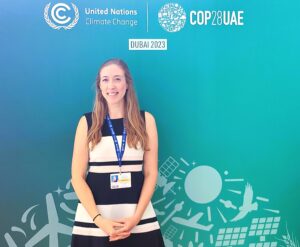
Katie Foster is an environmental anthropologist based at the University of Georgia. In 2023, she earned her Ph.D. in integrative conservation and anthropology from the University of Georgia. Her major professor was Laura German. Broadly, her research focuses on issues of environmental governance, justice and policy related to complex multi-scalar social-ecological challenges like changing climates, biodiversity loss and natural resource conflicts.
Foster recently joined the Network for Engineering with Nature as a postdoctoral researcher where she studies equity in decision making for water management (related to flooding, drought, sea level rise, etc.) to better understand how to incorporate local needs and knowledge systems into natural infrastructure planning in the US.
Her dissertation research focused on mining conflicts in the Peruvian Andes and the implementation of international Indigenous rights laws on free, prior and informed consent. She also holds a B.A. from Southwestern University, where she studied the behavioral ecology of aquatic invasive species in Uruguay and the southern U.S. She has written on a variety of conservation issues including global agricultural value chains, third-party environmental certifications and the illegal wildlife trade.
Outside of her academic pursuits, Foster has been involved in policy advocacy at the UN climate negotiations (COP 20, 21, and 28) and worked for several years in the non-profit sector in sustainable urban agriculture, native plant conservation and environmental education. Her abiding appreciation for gardens, soils, native plants and wildlife informs her academic interest in ecological restoration and commitment to teaching about sustainability in its many facets.
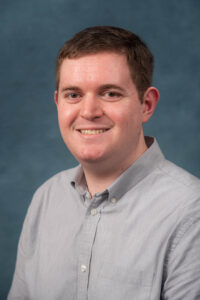
Mark Garren is a limited-term clinical assistant professor with UGA’s College of Engineering. He graduated with a Ph.D. from the College of Engineering’s Biomedical Engineering Program in spring 2023 and was mentored by Hitesh Handa.
His graduate work focused on developing novel material and surface design strategies for controlled delivery and catalysis of reactive species to mediate biological interactions at medical device interfaces.
To date, Garren’s work has led to more than 22 peer-reviewed journal publications and four provisional patent applications. During his Ph.D. studies, Garren was a recipient of the Georgia Research Education Award Traineeship as well as the Innovative and Interdisciplinary Research Grant and several travel fellowships from the UGA Graduate School.
In his clinical appointment, Garren is continuing to expand his work on reactive species technologies towards the improvement of therapeutic platforms and medical device technologies against infection, inflammation and thrombosis.
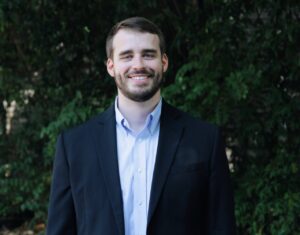
Matt O’Neal is a visiting assistant professor of history and study of southern culture at the University of Mississippi. O’Neal earned a Ph.D. in history from the University of Georgia in 2023, where he completed his dissertation, “Home and Hell: The Great Migration and the Making of Sundown Towns in Appalachia” under the direction of Scott Reynolds Nelson.
O’Neal is a historian of race, labor and migration in the U.S. South. He has authored publications in the Register of the Kentucky Historical Society and the New Georgia Encyclopedia, in addition to a forthcoming piece in the Journal of the Gilded Age and Progressive Era.
O’Neal has also been featured in a documentary produced by Black in Appalachia and has participated in public conversations on the legacies of racial violence.
In 2022, he received the Robert H. Zieger Prize from the Southern Labor Studies Association for the best unpublished essay by a graduate student or early career scholar.
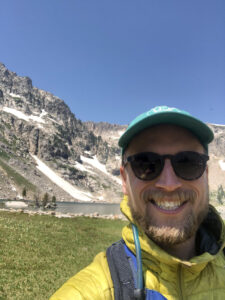
Nate Tomczyk is a research associate at the New Mexico Forest and Watershed Restoration Institute at New Mexico Highlands University. Tomczyk earned his Ph.D. in ecology at the University of Georgia in 2023.
Tomczyk grew up in Maine and pursued his undergraduate studies in ecology and environmental sciences at the University of Maine. The most formative parts of this experience were conducting research in wetlands and participating in a Research Experience for Undergraduates program that allowed him to conduct ecological research in the Arctic.
Following this he earned his master’s degree in ecology at the University of Georgia, studying heavy metal pollution of freshwater ecosystems, under the direction of Krista Capps.
After that, he walked home to Maine via the Appalachian trail before returning to UGA to work as a research professional in Amy Rosemond’s lab. From there, Tomczyk transitioned back into graduate school, working with Rosemond as his Ph.D. advisor. His doctoral research focused on the role of small freshwater streams in carbon and nutrient cycling and how these important functions are altered by warming and nutrient pollution. His field work was primarily conducted at the Coweeta Hydrologic Lab in North Carolina.
His research projects have used a wide range of methods to test questions at different scales and include laboratory studies of individual microbial taxa, experimental manipulations of sections of streams, and comparisons of environmental conditions on the conterminous United States.
Engaged Scholars
The inaugural Engaged Scholarship by Graduate Students Award recognizes extraordinary community-engaged scholarship and public service by graduate students. Such as endeavors that advance the public service, outreach, and engagement mission at UGA. This award is established by the Graduate School in connection with the Office of the Vice President for Public Service and Outreach and the Office of Service-Learning.
Three awards of $1,000 will be presented annually. Each graduate department may nominate one student. Recipients will be selected by a committee drawn from Public Service and Outreach-affiliated administrators and graduate faculty
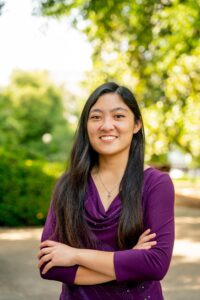
Alyssa Quan is an interdisciplinary ecology Ph.D. candidate in the Odum School of Ecology and in the integrative conservation program run by the Center for Integrative Conservation. Her major professor is Catherine Pringle. Her general interests include aquatic ecology, ethnobotany and animal behavior. She is originally from Southern California, and she graduated from the University of California Los Angeles in 2019 with a B.S. in ecology, behavior, and evolution.
Quan has conducted field science projects in various locations around the world, including Singapore, Malaysia, French Polynesia, the California coast and the Blue Ridge Mountains of North Carolina. Her work on fish behavior in Mo’orea, French Polynesia, is published in the scientific journal Current Zoology.
Currently, her doctoral dissertation research focuses on the ecological and cultural intersections of rivercane, which she is co-producing with partners from the Eastern Band of Cherokee Indians. Overall, they are interested in the process and outcomes of research co-production with indigenous knowledge and are studying how the impacts of cultural relationships with rivercane can inform restoration.

Ammy Sena is a Ph.D. candidate in counseling psychology at the University of Georgia. She is an immigrant of Dominican Republic, raised in Providence, Rhode Island. She received her master’s degree in mental health counseling from Boston College with a certificate in human rights and international justice. Additionally, Sena received her bachelor’s degree from Suffolk University, double majoring in psychology and Latin American and Caribbean studies with a minor in education.
Sena’s research interests include the mental health and wellness of marginalized communities with a primary focus on Afro-Latinx and Afro-Caribbean persons. Additionally, she is interested in exploring decolonized and liberatory forms of healing as well as racial identity development. Her clinical interests include bilingual (Spanish) counseling, anxiety, stress and trauma-related disorders. She is a member of the Bienestar Research and Outreach Team under the direction of Edward Delgado-Romero as well as a member of the Sankofa Research and Outreach team under the direction of Collette Chapman-Hilliard.
Sena served as co-coordinator of La Clinica in LaK’ech, a student-run mental health clinic under the direction of Delgado-Romero that provides free counseling to the Latinx community of Athens. Currently, she supervises student trainees seeking to enter the counseling field at La Clinica in La K’ech and at the Center for Counseling and Personal Evaluation. Sena is the instructor-of-record for ECHD 3030- Diversity and Helping Skills course and is a TA for ECHD 4660/6660 U.S. Latinx Mental Health: An Introduction.
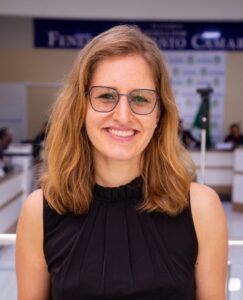
Cydney Kate Seigerman is a Ph.D. candidate in the Integrative Conservation and anthropology program. Their major professor is Don Nelson. Seigerman is an NSF Graduate Research Fellow and was a research fellow at the Research Institute for Meteorology and Water Resources in Ceará, Brazil, from 2021 to 2023. They earned their B.S. in chemistry and Spanish language and literature from the University of Michigan, graduating Phi Beta Kappa from the Residential and Honors Colleges. They then relocated to Madrid, Spain, where they served as a Fulbright English Teaching Assistant and studied acting at the theater school La Lavandería.
Seigerman is a transdisciplinary water scholar guided by the premise that equity and justice are fundamental to creating more sustainable futures. Their research examines the interactions among human behavior and the cultural, political, technological, and environmental factors that shape water governance. Seigerman works across the sciences and arts to develop more equitable solutions to water challenges.
Seigerman’s dissertation work examines how socionatural (i.e., interrelated sociopolitical, environmental and technological) processes shape and are shaped by the lived experience of water insecurity in Ceará, Northeast Brazil. Among their work across disciplines, Seigerman is a contributing author of “Chapter 4: Water” of the 2022 IPCC Report and collaborated with members of Quilombo Mearim, a rural community in Ceará, Brazil, to produce the play Mudanças na água do Quilombo Mearim (Hydrological Changes in Quilombo Mearim), which tells the story of the community’s water past, present and possible futures.


